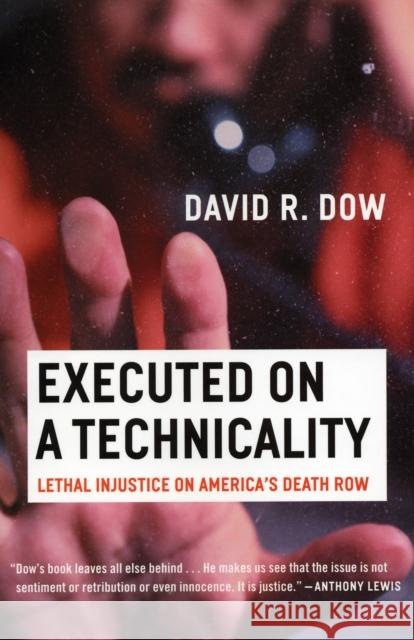Executed on a Technicality: Lethal Injustice on America's Death Row » książka
Executed on a Technicality: Lethal Injustice on America's Death Row
ISBN-13: 9780807044193 / Angielski / Miękka / 2006 / 238 str.
When David Dow was first asked to represent death row inmates, he supported the death penalty. Capital punishment was an abstraction to him, and he imagined that death row was filled with characters like Charles Manson and Hannibal Lecter. Dow gradually realized that his perception of the death penalty and those on death row was completely incorrect. Dow began witnessing the profound injustices the inmates consistently endured: from confessions coerced by the police to bizarrely incompetent lawyers; from corrupt prosecutors and backward judges to racist juries. None of his clients was a serial killer; some had been unarmed and perhaps unwitting accomplices; most were repentant; one turned himself in; several were obviously innocent. Not one of them fit the media stereotype of the hardened, heartless murderer, incapable of rehabilitation, undeserving of even a modicum of justice. And yet these are the men Dow came to know as he fought, often unsuccessfully, for their lives. In the end, he is forced to concur with Supreme Court justice Potter Stewart's famous pronouncement that being sentenced to death in America is like being struck by lightning; capital punishment isn't reserved for the most heinous criminals but is meted out arbitrarily. The cases in this eye-opening book are those of the men on death row who changed Dow's mind about capital punishment forever. You'll meet Johnny Joe Martinez, for instance, who was executed despite the fact that Dow convinced the court that he had strong grounds for an appeal. Martinez had exhausted his right of appeal when his lawyer wrote a mere seventeen-line-long appeal; he was executed on a technicality. Roger Coleman was denied an appeal because, although his lawyers mailed the appeal notice on time, it was received literally one day too late; he was executed because his lawyers failed to use registered mail. Another inmate was executed despite his court-appointed lawyer's shocking and demonstrable incompetence: the lawyer arrived at the courtroom drunk and snorted cocaine in the bathroom during breaks in the testimony. All of these men were executed on technicalities. These concrete accounts of the people Dow has known and represented prove that the death penalty is consistently unjust, and it's precisely this fundamental-and lethal-injustice, Dow convincingly argues, that should compel us to abandon the system altogether.
When David Dow was first asked to represent death row inmates, he supported the death penalty. Capital punishment was an abstraction to him, and he imagined that death row was filled with characters like Charles Manson and Hannibal Lecter. Dow gradually realized that his perception of the death penalty and those on death row was completely incorrect.Dow began witnessing the profound injustices the inmates consistently endured: from confessions coerced by the police to bizarrely incompetent lawyers; from corrupt prosecutors and backward judges to racist juries. None of his clients was a serial killer; some had been unarmed and perhaps unwitting accomplices; most were repentant; one turned himself in; several were obviously innocent. Not one of them fit the media stereotype of the hardened, heartless murderer, incapable of rehabilitation, undeserving of even a modicum of justice. And yet these are the men Dow came to know as he fought, often unsuccessfully, for their lives. In the end, he is forced to concur with Supreme Court justice Potter Stewarts famous pronouncement that being sentenced to death in America is like being struck by lightning; capital punishment isnt reserved for the most heinous criminals but is meted out arbitrarily.The cases in this eye-opening book are those of the men on death row who changed Dows mind about capital punishment forever. Youll meet Johnny Joe Martinez, for instance, who was executed despite the fact that Dow convinced the court that he had strong grounds for an appeal. Martinez had exhausted his right of appeal when his lawyer wrote a mere seventeen-line-long appeal; he was executed on a technicality. Roger Coleman was denied an appeal because, although his lawyers mailed the appeal notice on time, it was received literally one day too late; he was executed because his lawyers failed to use registered mail. Another inmate was executed despite his court-appointed lawyers shocking and demonstrable incompetence: the lawyer arrived at the courtroom drunk and snorted cocaine in the bathroom during breaks in the testimony. All of these men were executed on technicalities.These concrete accounts of the people Dow has known and represented prove that the death penalty is consistently unjust, and its precisely this fundamental-and lethal-injustice, Dow convincingly argues, that should compel us to abandon the system altogether.











